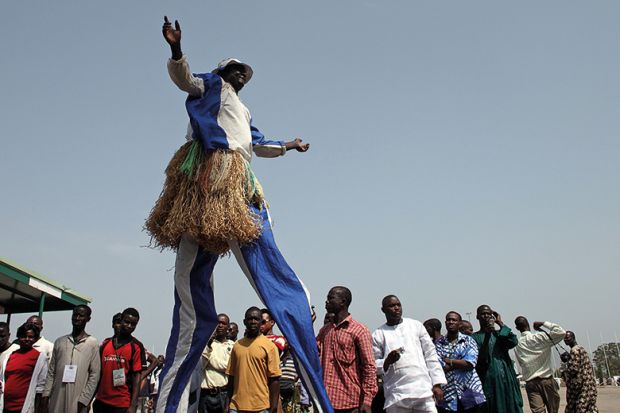World University Rankings 2023: results announced
Browse the full results of the World University Rankings 2023
Download a copy of the World University Rankings 2023 report
African universities are increasing their scores at a higher rate than the global average, and the number of African countries represented in the latest Times Higher Education World University Rankings is growing rapidly.
The average overall score across Africa increased by 1.2 points between 2022 and 2023 to 29.0, while the world average grew by 0.7 over the same period.
There are now 17 African countries in the ranking in total, compared with nine in 2018. This year has seen the rankings debut of 25 African universities, while Zambia, Namibia, Mozambique, Zimbabwe and Mauritius all make their first appearance.
Africa’s biggest score increase came in citations, going up by 2.5, from 45.3 to 47.7, making this the highest average pillar score across the continent.
“A lot of local researchers were engaged at the start of the pandemic to finish off projects that global experts couldn’t travel for,” said Gordon Adomdza, associate professor of entrepreneurship and innovation at Ashesi University in Ghana.
“I experienced this myself. So that could have increased involvement in research by local researchers, hence the uptick in citations. The real test is if it sustains post-pandemic.”
The second-highest pillar score for Africa is for international outlook, with an average score of 43.5 (up from 42.7 last year).
South Africa has the highest average overall score of the continent, 39.8, the same score it had last year.
The country with the biggest improvement in overall score is Nigeria, rising from an average of 27.9 to 31.5 and overtaking Egypt to claim the number two spot (based on countries with five or more universities ranked and the same universities ranked each year). There are now 12 Nigerian universities ranked, twice as many as last year.
Jamil Salmi, former tertiary education coordinator for the World Bank, pointed out that Nigeria had 17 regional centres of excellence supported by the World Bank and “some of them have really built up their research capacity in an impressive way. For example, Covenant University [has improved] in health.”
The highest-ranking institutions in Nigeria are the University of Ibadan and the University of Lagos, both in the 401-500 bracket and boasting an overall score of between 42.1 and 44.9, while Covenant ranks in the 601-800 bracket.
Ebenezer Obadare, senior fellow for Africa studies at the Council on Foreign Relations in the US, was wary of getting carried away about improvements in Nigerian higher education, pointing to ongoing problems such as a strike by professors that is now into its ninth month.
However, he added, “against all odds” Nigerian academics appeared to be taking advantage of three factors, namely “the rise in the pure number of peer-reviewed journals across all disciplines; democratisation of access to such journals enabled by digitisation; and increased collaboration between Nigerian academics based in Nigeria and in the diaspora, leading to greater access to outlets for dissemination of research findings”.
Although Egypt dropped to third place among the continent’s strongest-performing countries, it still improved in overall score, rising from 28.6 last year to 31.0, the second sharpest increase. The highest-ranking institution in Egypt is Aswan University, which is in the 401-500 bracket.
Marwa Mamdouh-Salem, professor at the American University in Cairo, said the improvement of Egyptian universities in the rankings could be a result of their having had more time to conduct research during the pandemic and beginning to reap the benefits of the Ministry of Higher Education’s “open door” policy encouraging international cooperation. Several medical schools have also improved in quality, he added.
The countries with the lowest average score were Morocco and Algeria, with 21.8 and 18.8 respectively, based on countries with five or more universities ranked each year. Algeria was the only country to see a drop in score, from 18.9 last year to 18.8 in the 2023 ranking.
POSTSCRIPT:
Print headline: Continent powers up its higher education
Register to continue
Why register?
- Registration is free and only takes a moment
- Once registered, you can read 3 articles a month
- Sign up for our newsletter
Subscribe
Or subscribe for unlimited access to:
- Unlimited access to news, views, insights & reviews
- Digital editions
- Digital access to THE’s university and college rankings analysis
Already registered or a current subscriber?








